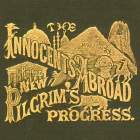
A comprehensive site at
Virginia Tech lets
you search the author's
works, view the pictures
from the book, read
contemporary reviews,
follow an interactive
map of the journey, or
even read the book. It's
pretty impressive.
Mark Twain
|
EXCURSION TO THE HOLY LAND, EGYPT, THE CRIMEA, GREECE, AND INTERMEDIATE POINTS OF INTEREST.
BROOKLYN, February 1st, 1867
|
The appeal of this narrative is in Twain's charming prose, which alternates between humbled awe and scathing sarcasm. Twain also reveals unashamed prejudice toward the non-Western and non-Christian peoples he encounters. The Turks are especially abused, but generally all the easterners our pilgrim introduces are categorized either by their foul smell or some other unpleasant attribute. Nevertheless, he concludes: "Travel is fatal to prejudice, bigotry and narrow-mindedness, and many of our people need it sorely on these accounts. Broad, wholesome, charitable views of men and things can not be acquired by vegetating in one little corner of the earth all one's lifetime."
Try to find a reprint of the original, with 234 illustrations.
| STORY | * * * |
| IDIOM | * * * |
| IDEAS | * * |
| COVER | * * |
After browsing among the stately ruins of Rome, of Baić,
of Pompeii, and after glancing down the long marble ranks
of battered and nameless imperial heads that stretch down
the corridors of the Vatican, one thing strikes me with a
force it never had before: the unsubstantial, unlasting
character of fame. Men lived long lives, in the olden time,
and struggled feverishly through them, toiling like slaves,
in oratory, in generalship, or in literature, and then laid
them down and died, happy in the possession of an enduring
history and a deathless name. Well, twenty little centuries
flutter away, and what is left of these things? A crazy
inscription on a block of stone, which snuffy antiquaries
bother over and tangle up and make nothing out of but a bare
name (which they spell wrong) -- no history, no tradition, no
poetry -- nothing that can give it even a passing interest.
What may be left of General Grant's great name forty centuries
hence? This -- in the Encyclopedia for A. D. 5868, possibly:
"URIAH S. (or Z.) GRAUNT -- popular poet of ancient times in
the Aztec provinces of the United States of British America.
Some authors say flourished about A. D. 742; but the learned
Ah-ah Foo-foo states that he was a cotemporary of Scharkspyre,
the English poet, and flourished about A. D. 1328, some three
centuries after the Trojan war instead of before it. He wrote
'Rock me to Sleep, Mother.'"
These thoughts sadden me. I will to bed.
[p. 336]
Send your comments.
